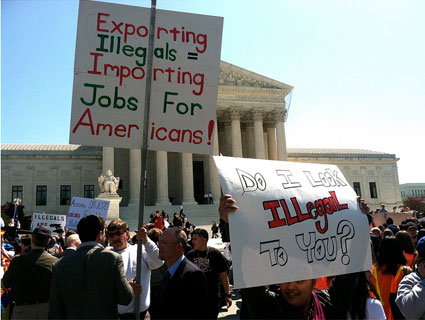
<a href="http://www.flickr.com/photos/gageskidmore/6316170779/sizes/m/in/photostream/" target="_blank">Flickr/Gage Skidmore</a>
Arizona Governor Jan Brewer sounded triumphant Monday as she declared that the “heart” of SB 1070, Arizona’s harsh anti-illegal immigration law, had been “upheld” by the Supreme Court.
“The heart of Senate Bill 1070 has been proven to be constitutional. Arizona’s and every other state’s inherent authority to protect and defend its people has been upheld.”
There’s just one problem: The high court did not find any provision of Arizona’s law to be constitutional—it did not “uphold” any part of the law. The distinction here is a technical legal one, and plenty of reporters and media outlets got it wrong. (My first tweet about the ruling was wrong. Politico, the Los Angeles Times*, and PBS’ Newshour also initially misreported the ruling.) Other supporters of the law, including Maricopa County, Arizona Sheriff Joe Arpaio and Kansas Secretary of State Kris Kobach (who is a lawyer) also referred to part of the law being “upheld.”
Here’s what the Supreme Court actually did on Monday. The justices decided that the lower court that prevented SB 1070 from taking effect was mostly correct—because most of the law’s provisions were likely unconstitutional. The Supreme Court declined to block the “papers, please” provision of the law—which Brewer refers to as its “heart”—that requires local authorities to check the immigration status of anyone they arrest. But the high court did not find the controversial provision constitutional, and so it was not “upheld.” Instead, the high court deferred judgment on the matter. Saying that part of the law was “upheld” incorrectly implies that the court decided the “papers, please” provision was constitutional. The justices were actually decidedly agnostic on that point.
“The majority said it didn’t know enough about how the law would work in practice to rule decisively. Because the law has never gone into effect, it just wasn’t clear whether the law would conflict with federal policy.” says Adam Winkler, a professor at the University of California Los Angeles School of Law who wrote a column for the Daily Beast noting that many media outlets got the distinction wrong. “The court said to Arizona there’s a right way and a wrong way to apply this law and we’re watching you.”
Although it’s anyone’s guess how the court might ultimately rule on the “papers, please” provision, Justice Anthony Kennedy’s opinion gives very specific guidance on how that part of the law should be enforced. That suggests that in the future, the court could very well find the provision unconstitutional—meaning that Brewer’s celebration was beyond premature.
“They absolutely left open the possiblity of future challenges,” says Elizabeth Wydra, chief counsel at the liberal Constitutional Accountability Center. “We achieved victory on three out of the four provisions [Monday], and I think it’s going to be a delayed victory on the fourth.”
*Correction: This post previously stated that Washington Post reported that the section was “upheld.” The headline was actually “upheld for now,” which is accurate.










